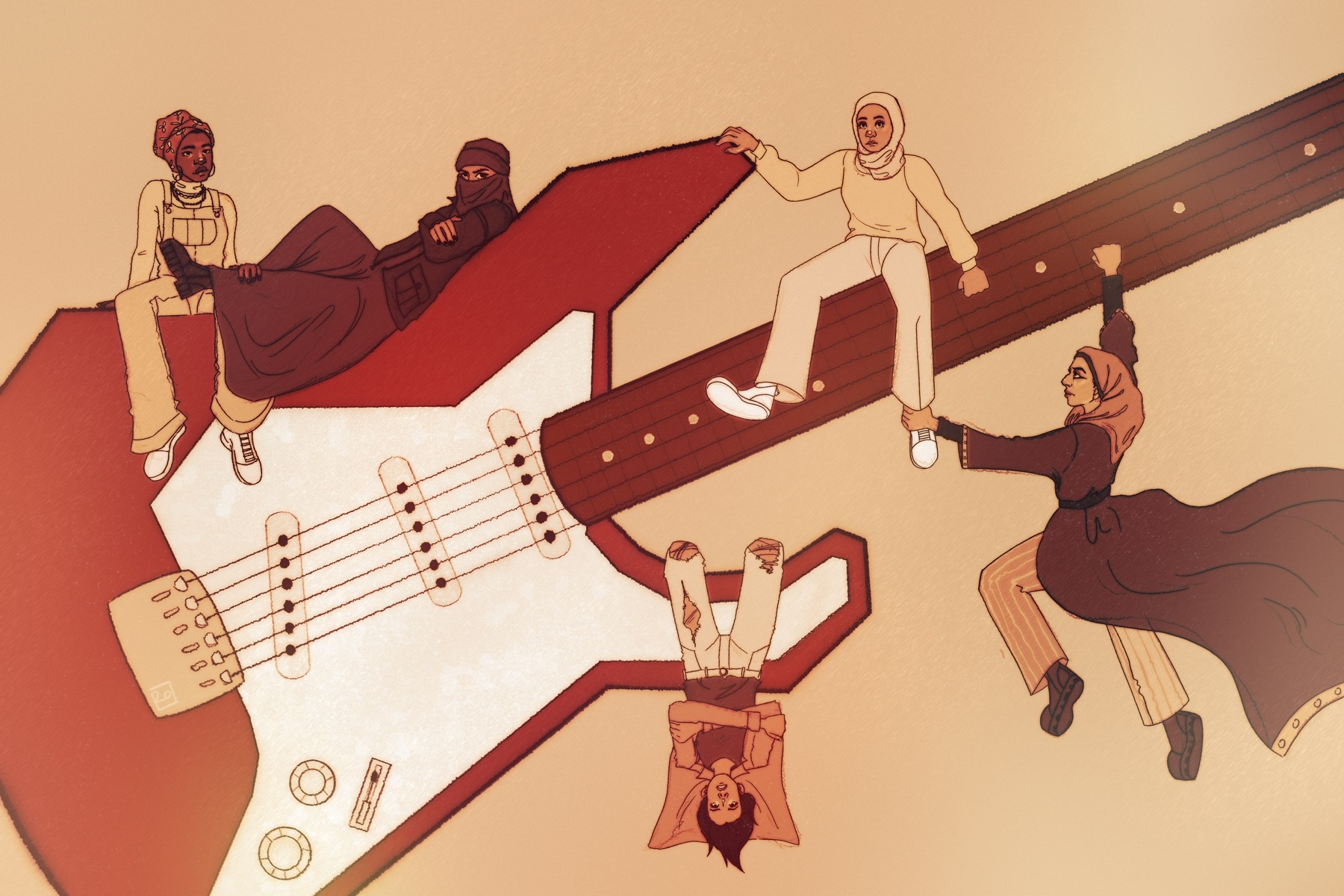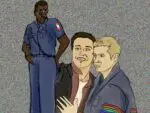“We Are Lady Parts,” the British sitcom that was recently added to NBC’s Peacock, sits comfortably at an 80% audience score rating on Rotten Tomatoes. Surprisingly, audiences were less generous than critics, who rated the show 100% — perhaps with an overabundance of pro-representation enthusiasm.
Show creator Nida Manzoor crafted a solid landmark in Muslim representation with her series. However, “We Are Lady Parts” falls short of the deft comedy and deeper meaning that would have truly earned it that perfect score. Even so, the sitcom provides viewers with relatively fresh and original brain candy that distracts them from the real world’s drudgery.
“We Are Lady Parts” stars Anjana Vasan as Amina, a 26-year-old Ph.D. student studying microbiology. Amina lives in London with her parents who, like her, are devout Muslims. However, her parents differ radically from their daughter when it comes to personality: They are merry oversharers who unsuccessfully attempt to dampen Amina’s eagerness for matrimony … at least, until the devoted guitar player reluctantly agrees to join the all-female punk band We Are Lady Parts.
Five hilarious women invigorate the band — Anima, three performers and the band’s manager — all of whom are Muslims that are drastically different than Amina. Amina’s bandmates are the self-appointed rebel types who scream songs with titles like “Voldemort Under My Headscarf” and sell comics about a dystopian world where women “become homicidal maniacs when they’re on their period.”
These women, along with Amina’s relatable yet stereotype-defying parents, charm the show and highlight Amina’s own limits. The characters sing, work and play with wholehearted abandon, forcing Amina to widen her own psychological boundaries.
Amina is fearfully neurotic, the kind of character who, as a child, only ever dipped her toes in the water, afraid to jump in. Overall, Amina is a temperamental machine — a complete mess. Her mother even goes as far as to declare to Amina’s potential spouse and his parents that her daughter’s “nervy disposition induces diarrhea and vomiting.” Throughout “We Are Lady Parts,” viewers may find themselves musing to themselves, “at least I’m not that anxious.”
Somehow, however, Amina’s weaknesses succeed in endearing her to the show’s audience. As Time magazine put it, “Vasan’s performance is endearingly vulnerable.”
Amina’s extensive imagination also enlivens her character. The young woman narrates “We Are Lady Parts” with colorful, elevated diction that highlights her observational astuteness as well as Manzoor’s perceived need of inserting as many jokes into the show as possible. The result is a tone that comes off as charming at times and eye-roll-worthy at others.
Another aspect of Manzoor’s character that borders between funny and overwrought is her habit of launching into fantasies. Amina’s mind repeatedly runs wild and hijacks a scene, placing her daydreams before viewers as if they were actually happening. One example of this inconvenience occurs when she’s talking to her crush, Ahsan. Amina pictures Ahsan beside a train, asking her in an old-timey British accent whether or not she is “spoken for.”
Though this humor hits viewers on the head a bit too hard at times, its net gain still far exceeds its loss. Perhaps this is because the sitcom’s slapstick humor plays out more authentically in the supporting cast of “We Are Lady Parts,” who are naturally inflamed. The clearest example is lead vocalist Saira, played by Sarah Kameela Impey, who relishes her day job as a butcher and attempts to physically attack Amina when she suggests the band change the lyrics of “Voldemort Under My Headscarf” to something more along the lines of “I love wearing my headscarf.”
As the series progresses, viewers learn more about Saira and the other band members and are able to discern more about their personalities. Saira is the kind of character who devotes her energy to the band with the intensity of an addictive personality on the hunt for personal fulfillment. As Amina narrates to her audience, the band is built from one part boredom and — thanks (at least partially) to Saira — two parts identity crisis.
Impey seamlessly portrays Saira’s jerky, overly matter-of-fact inflection, so well so that by the third episode Saira is revealed as a vulnerable individual trying her best to rectify her childhood trauma.
Saira, as well as the series’ other charming and punchy characters, just manage to edge “We Are Lady Parts” into the realm of emotional satisfaction. It’s fun to watch the bandmates work together, especially when they’re collaborating on their original songs. The punk sounds they create resonate in viewers’ ears without straining for perfection. In the words of Vulture, the tunes are “rousing and authentically rough.”
However, the emotional ups and downs that 25-minute sitcom episodes necessitate make “We Are Lady Parts” feel formulaic and at times somewhat tiresome. With each hook, cliffhanger and plot twist, viewers recall that they are watching a contrived, artificial world, and they never quite manage to forget about their day at work and fully immerse themselves in the series.
In addition to its pacing, Manzoor’s thematic content — or lack thereof — also limits “We Are Lady Parts.” Unlike other NBC sitcoms such as “The Good Place” or even “Parks and Recreation,” Peacock’s “We Are Lady Parts” fails to raise an idea more complex than that Muslim women are powerful, nuanced individuals.
Of course, Manzoor accomplishes a tremendous feat by presenting young Muslim women so successfully. Accurately portraying under-represented individuals is an enormous burden, and Manzoor’s bravery and perseverance shine against the origins of “We Are Lady Parts.”
The show started as a blap for YouTube’s Channel 4 Comedy, and though it received “an amazing response” overall according to The Guardian, the minority of viewers who attacked Manzoor’s creation were virulent enough to make it the only blap with disabled comments on YouTube.
Despite this, Manzoor’s passion for the purpose of her comedy kept her going. As she described to U.K. news site i, “Frustrated by the stereotypical narratives about Muslim women in the media as oppressed victims, lacking agency and self-hood, I wanted to write something that reflects me, my friends, the world I know.”
Manzoor’s end result deserves commendation but not necessarily rave aesthetic reviews from seasoned critics. Articles from Rolling Stone, The Guardian and Time magazine focus almost exclusively on Manzoor’s take on representation rather than on the series as a whole.
One source wades the waters of aesthetic criticism but doesn’t dive deep. Rolling Stone reviewer Alan Sepinwall wrote that representation can “breathe new life into every stale plot twist simply because of the nature of the people involved.”
Though Sepinwall makes an excellent point, he fails to recognize that representation enough does not animate or elevate a series to artistic triumph. Unlike the popular audience, he responded to “We Are Lady Parts” with his head, not his heart — or perhaps his heart was swayed by popular trends and cultural pressure to focus on ideology at the expense of artistry.
The claim that Muslim women live with a sense of agency and a deep appreciation for risk blows a puff of pine-scented air into both American and European television. However, “We Are Lady Parts” ultimately fails to offer exceptional entertainment because it lacks complex ideas, without which art cannot continue to expand and break barriers.
















